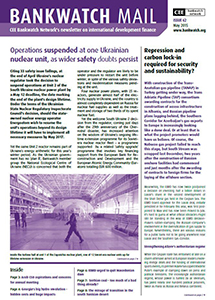Some Arab CSO aspirations and concerns for the EBRD annual meeting

Bankwatch Mail | 14 May 2015
The economic model with which the EBRD operates often fails to understand and respond to the development challenges of Arab countries.
This article is from Issue 62 of our quarterly newsletter Bankwatch Mail
Browse all articles on the right
In 2011, the Deauville partnership for Arab countries in transition was signed, expanding the EBRD’s mandate to cover the South and Eastern Mediterranean (SEMED) region. Working towards ‘sustainable growth’ and ‘private-sector development’, the bank’s initial intervention in each of the Arab countries – namely Egypt, Tunisia, Morocco and Jordan – has provided funding, technical assistance and policy dialogue and capacity-building. The EBRD is providing loans, equity investments and guarantees for private and public sector projects in the areas of finance, infrastructure, industry and commerce. By the end of 2014, the EBRD had disbursed a total of EUR 1.5 billion in 53 projects, becoming one of the biggest financial stakeholders in the region.
The EBRD’s engagement in the region has so far been focused on four main areas: energy (30.25 percent), financial institutions leasing (27.25 percent), industry, commerce and agribusiness (29.75 percent) and infrastructure (12.75 percent).
As Hildegard Gacek, EBRD Managing Director for the SEMED region, has suggested, “this illustrates our commitment to supporting the countries’ transition towards a market-based economy through targeted investments and policy dialogue with the authorities.” Others, such as Arab NGO Network for Development, maintain that the EBRD’s engagement in the region needs to be well scrutinised, particularly when it comes to social and economic rights and development impacts, as “the economic model with which the EBRD operates often fails to understand and respond to the development challenges of Arab countries.”
What are the specific critical issues, from an Arab civil society perspective, pertaining to the EBRD’s presence in the SEMED region? At the bank’s 2015 annual meeting in Tbilisi, an innovative step has been introduced by the EBRD – called “inclusive agenda setting” – whereby civil society groups have been invited to suggest topics covering EBRD projects, initiatives and other political, socio-economic and environmental issues in the countries where the bank works. The following themes will hopefully be up for discussion and dialogue.
Energy concerns
Energy is a key sector for the EBRD’s engagement in the region. For instance, in Jordan, 50 percent of the bank’s portfolio is being allocated to the sector. Nevertheless questions hang over several aspects of the EBRD’s energy investments in the region, including support to renewable versus non-renewable energy, the environmental impacts of these projects and the engagement of local communities.
In February 2015, despite calls from civil society groups in the region (pdf), the controversial Cemex project in Egypt was approved. Concerns raised regarding the project’s support to coal despite the availability of renewables, the negative impacts deriving from the release of heavy metals such as mercury and lead and water pollution – these were simply not heard by the EBRD’s board of directors. A similar case occurred in Tunisia with the Serinus project, involving significant finance for the development of four oil and gas fields in a protected area in Tunisia. Again local groups’ concerns both about the negative impacts deriving from the exploitation of shale gas and the project’s water scarcity and radioactivity issues were not taken into consideration.
Underlying these cases are problems regarding the lack of an inclusive and participatory approach in the design of EBRD projects, not to mention the miscategorisation of the projects when it comes to environmental impacts. A study of EBRD projects in the SEMED region shows that they are systematically categorised ‘B’, meaning that:
“the potential adverse environmental impacts on human populations or environmentally important areas (…) are less adverse than those of category A projects (…). These impacts are site-specific; few if any of them are irreversible.”
On SMEs support as a role model for social enterprises
At the 2015 annual meeting, and with a specific session, the EBRD intends to look at how support to small- and medium-sized enterprises (SMEs) could become an exemplar for overcoming barriers to the development of social entrepreneurship specifically related to financial literacy, access to finance and regulatory frameworks.
First of all, support to SMEs is critical: in the region they are seen as catalysts for employment creation and income generation. The EBRD, in its four main areas noted above, prioritises assistance to SMEs to help spur job creation and stem high unemployment, especially among young people. Yet, as has been raised by CSOs from the Arab region, such a sectorial approach from the bank is problematic (pdf): there is a need for the EBRD to focus on sectors that are a priority within the country itself, and not according to what the bank deems to be the priorities. Indeed, the EBRD’s current engagement in this regard is not contributing to the enhancement of the countries’ productive capacities, and, as noted by the UK Department for International Development in its Multilateral Aid Review in 2013 (pdf), “the link between the impact of EBRD’s programs on transition, and their impact on people’s lives is not always well articulated”.
Accordingly, the EBRD should start focusing its intervention in agriculture, industry and services aimed at longer-term employment generation and improved standards of living. For instance, the bank could make an economic and developmental difference by directing its funds to industries that are expected to be of added value in the future, particularly in the manufacturing sector. At the same time, with regard to social enterprises, the concept is highly relevant for the Arab region, particularly given people’s movements and initiatives during and after the uprisings, where innovative approaches have been seized and developed. Advancing societal benefits and addressing the root causes of societal problems, dealing with key challenges such as lack of finance, government interference, and the difficulty of registering NGOs – boosting social entrepreneurship further is now needed more than ever.
‘PPP mania’

Not a silver bullet for public infrastructure. Our website Overpriced and underwritten exposes the hidden costs of public-private partnerships.
The EBRD is not shy about its preference for the public-private partnership (PPP) model, especially when infrastructure projects are involved, as well as healthcare and energy distribution. The ways in which PPPs are designed (most of the time in order to satisfy the interests of major corporations first, with states and populations subsequently being left accountable to these corporations), and the abuses linked to these practices are issues of great concern to Arab CSOs right now. There is a need for actual accessibility to and affordability of public services, rather than the increased commodification of basic needs and citizens being transformed into public service consumers.
Arab CSO concerns at the meeting will also reflect on the need to further enhance the participatory approach, one that engages civil society groups and local communities not only in project evaluation but in project design that pays due attention to developmental impacts. Greater transparency across the EBRD’s operations will also be on the agenda. The opportunity for dialogue is most welcome; to be of any value, the discussion has to be forthcoming and rich.
Theme: Social & economic impacts | Development
Location: Egypt | Tunisia | Morocco | Jordan
Tags: BW Mail 62 | MENA
Never miss an update
We expose the risks of international public finance and bring critical updates from the ground. We believe that the billions of public money should work for people and the environment.
STAY INFORMED
